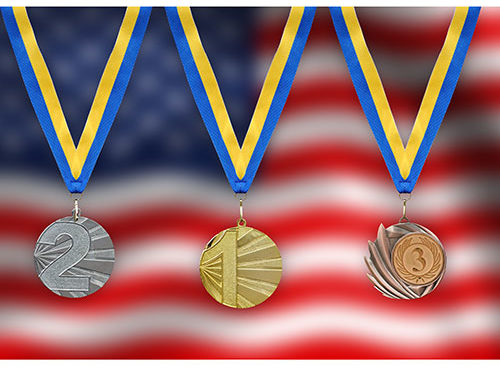If it ain’t broke, don’t fix it.
That must have been the philosophy of the Chinese delegation when putting together this year’s men’s world team, which consists of five of the same members of last year’s gold medal team from Rotterdam. The only gymnast left off was 2009 world rings champion and 2010 world rings silver medalist Yan Mingyong, who competed rings and pommel horse in last year’s world team finals. His replacement will be first-time world team member Guo Weiyang, who finished third on pommel horse and sixth on rings at the Chinese Nationals in May. Below are the six gymnasts who will represent China in Tokyo, along with some highlight statistics of each:
Teng Haibin: Olympic pommel horse champion in 2004, world pommel horse champion in 2003, silver medalist on parallel bars in 2010; competed pommel horse, parallel bars, and high bar in the 2010 world team finals
Chen Yibing: Olympic rings champion in 2008, three-time world rings champion in 2006, 2007, and 2010; competed rings and vault in the 2010 world team finals
Feng Zhe: World parallel bars champion in 2010, world silver medalist on parallel bars in 2009; competed floor, vault, parallel bars, and high bar in the 2010 world team finals
Zhang Chenglong: World high bar champion in 2010; competed floor and high bar in the 2010 world team finals
Lu Bo: Competed floor, pommel horse, rings, vault, and parallel bars in the 2010 world team finals
Guo Weiyang: No world or Olympic experience
Alternate
Zou Kai: Olympic floor and high bar champion in 2008, world high bar champion in 2009, world silver medalist on floor in 2009
The Chinese men currently have an incredible running streak of world team titles and are the reigning 2008 Olympic team champions. The last time this team lost the world team title was in 2001, and that was with a “B” team that placed 5th at the worlds in Ghent, Belgium. If we don’t count those worlds, we’d have to go all the way back to the 1991 worlds in Indianapolis, when the Soviet Union was still united, to find when China last lost the world men’s team gold!
The Olympics have been a different story. Despite winning every world team title in the last twenty years except for one in 2001, China has let two Olympic team titles slip away during that time – in Atlanta 1996 (won silver behind the Russians) and in Athens 2004 (performed disastrously to finish 5th). This team did strike Olympic gold in Sydney 2000, and in Beijing 2008, they put together perhaps the most dominant team performance in Olympic gymnastics history – beating second-place Japan by well over seven points in the team final and winning the all-around gold and five out of six available golds in event finals – including gold and silver on rings. We’ve seen dominant teams from Japan and the Soviet Union in decades past, but no team has ever dominated an Olympic Games quite like that – and they did it in front of their own home crowd.
Since 2008, the Chinese delegation has played the rules quite well – adapting the selection of its team carefully according to the format of each particular world championships. At the 2009 individual worlds in London, the Chinese sent multiple event specialists who won four out of six available golds (and silver on a 5th event), but entered no all-around participants. At the 2010 worlds in Rotterdam, several of its individual world champions were curiously absent, but it still put together a well-rounded squad of gymnasts who could compete in multiple events – and once again came away with the gold.
Although five members of its 2010 gold medal squad are once again on the roster, it should be noted that China didn’t dominate the team competition in Rotterdam like it did in Beijing. When all was said and done after last year’s team finals, they outscored second place Japan by just 1.228 – a far cry from the 7.25 they won by in Beijing – and in fact showed some significant vulnerabilities throughout the competition. Their pommel horse total of 43.099 (13.2, 14.433, 15.466) was only good enough for 6th place among the 8 teams, and they were outscored by two teams on both high bar (USA and Germany) and vault (Japan and Korea). And though they did post the highest floor total in Rotterdam, they looked quite beatable on that event as well, as none of their gymnasts broke a 15.
Had it not been for China’s monstrous rings total, which was nearly two full points ahead of its nearest competitor, China’s golden streak may have well come to an end last year. But that was with both of its world rings champions – Chen Yibing and Yan Mingyong – in the lineup. This year they’ve replaced Yan Mingyong with Guo Weiyang, who doesn’t appear capable of scoring the massive 16’s we’ve seen from the two elder ringsmen.
Given this team’s trouble on pommel horse last year, I was also surprised to see they didn’t place 2009 world pommel horse champion Zhang Hongtao or multiple world and Olympic pommel horse champion Xiao Qin on the squad, as both of these gymnasts scored over a 16 at the Chinese Nationals in May. Newcomer Guo Weiyang will likely be expected to step in here as well, and though he did place third on this event at the nationals, he scored about a point lower than both of the world champions with a 15.25. They also bypassed Olympic floor and high bar champion Zou Kai for the second year in a row, favoring Zhang Chenglong, who will likely once again compete floor and high bar for this team in Tokyo.
Is this the wisest team choice for the Chinese, who will be facing a powerful Japanese squad led by the unstoppable Kohei Uchimura in Japan’s home country, a German squad that’s recharged with Fabian Hambuechen, and one of the strongest American squads we’ve ever seen?
Just as on the women’s side, we’ve got four teams who could all be in a fairly tight battle in Tokyo. We’ll take a closer look at this battle in another post.



Lu Bo is now replaced by Yan Mingyong, and Yan would probably end up as the alternate.